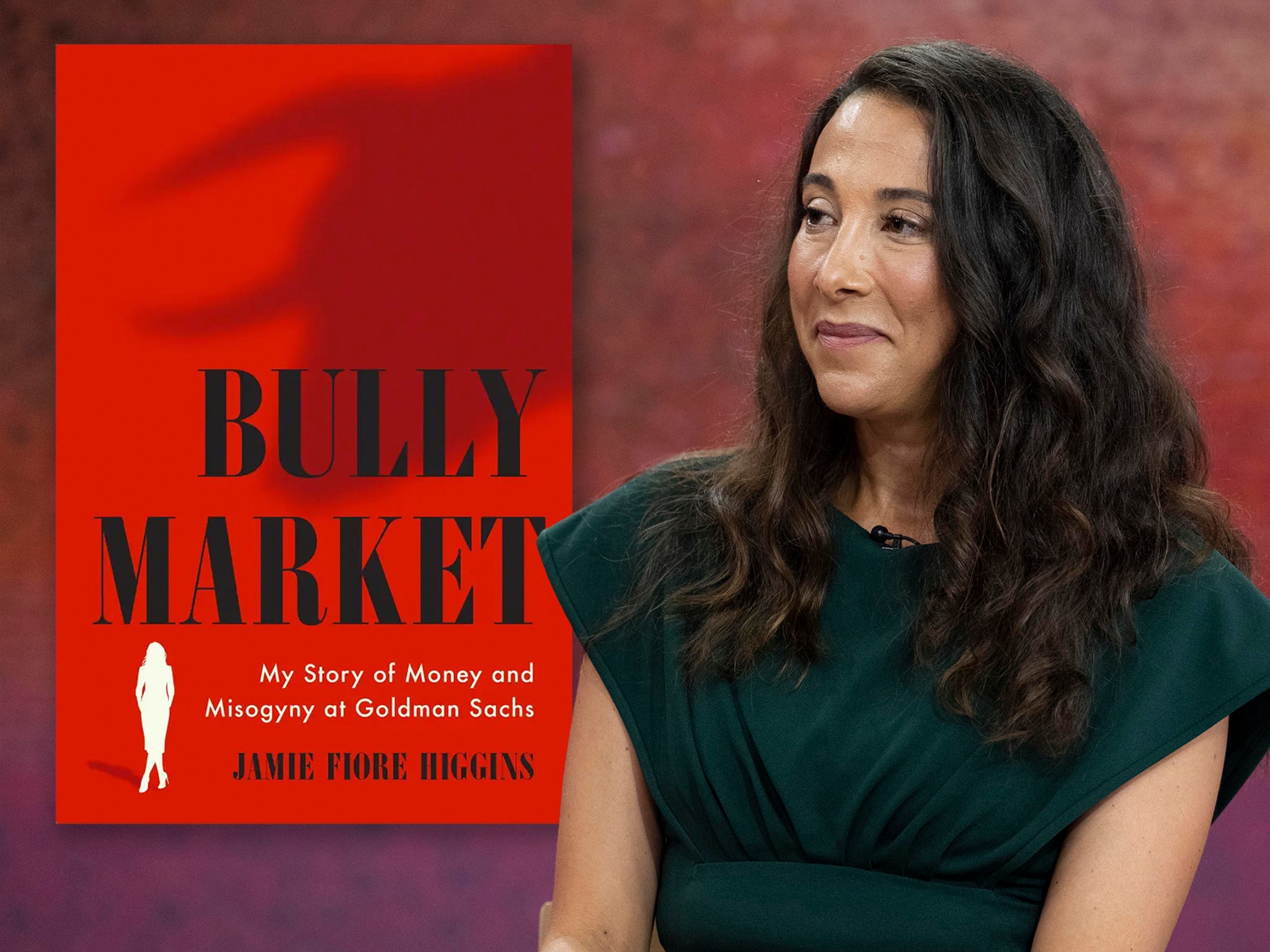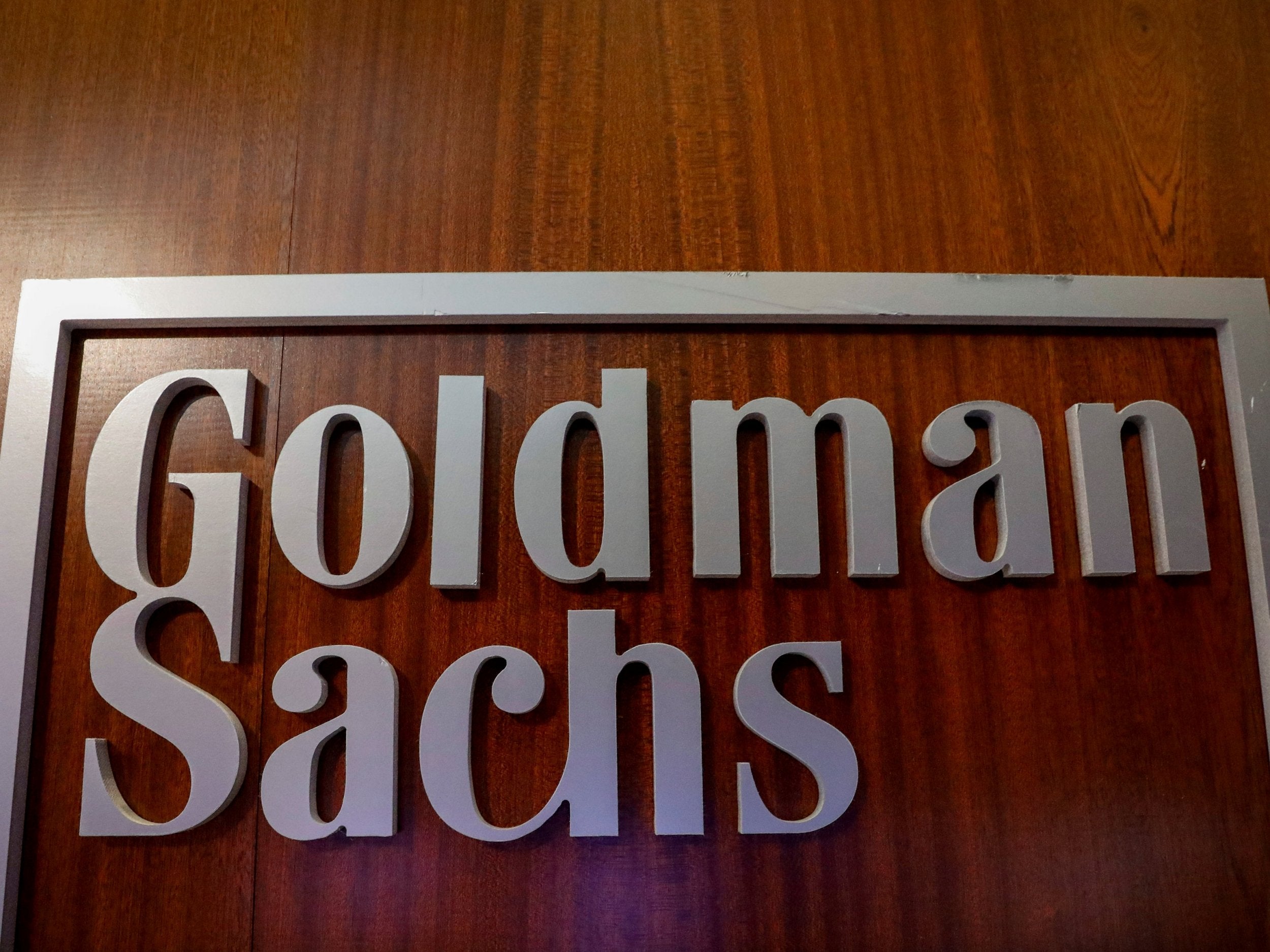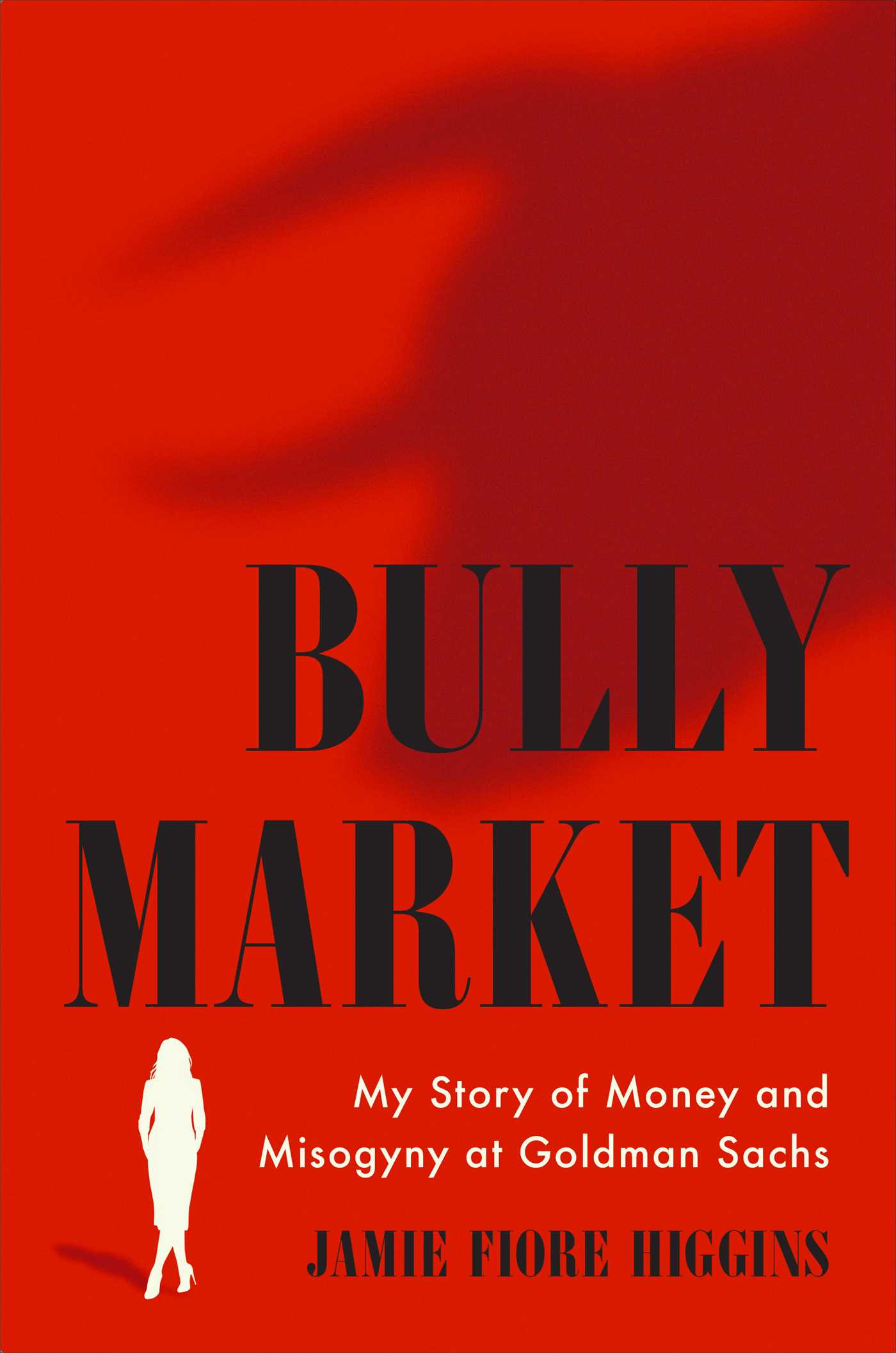Ex-Goldman Sachs managing director reveals rampant sexism and bullying on Wall Street in explosive new memoir
After rising from working class roots to the C-suite at New York’s leading investment back, Jamie Fiore Higgins tells Bevan Hurley how the finance industry can fix its toxic masculinity problem


Your support helps us to tell the story
From reproductive rights to climate change to Big Tech, The Independent is on the ground when the story is developing. Whether it's investigating the financials of Elon Musk's pro-Trump PAC or producing our latest documentary, 'The A Word', which shines a light on the American women fighting for reproductive rights, we know how important it is to parse out the facts from the messaging.
At such a critical moment in US history, we need reporters on the ground. Your donation allows us to keep sending journalists to speak to both sides of the story.
The Independent is trusted by Americans across the entire political spectrum. And unlike many other quality news outlets, we choose not to lock Americans out of our reporting and analysis with paywalls. We believe quality journalism should be available to everyone, paid for by those who can afford it.
Your support makes all the difference.Shortly before our interview is due to start, Jamie Fiore Higgins emails to ask if the start time can be pushed back by 15 minutes.
When she gets on the line she explains apologetically that she’s been up most of the night caring for her father, who is unwell.
“The old Goldman Jamie would be so stressed about that, because that would be a really bad thing to ask of someone,” she says.
“One misstep would paralyse you with anxiety,” she says. “My whole adult career, I lived and died by what that firm thought of me.”
But then in 2016, Ms Fiore Higgins quit. She’d spent 17 years rising through the ranks at Goldman Sachs – one of the few women to reach the title of managing director – and was earning a pre-bonus salary of $875,000.
Her new book Bully Market: My Story of Money and Misogyny at Goldman Sachs lays bare a culture of rampant greed and overt sexism and bullying from her mostly male co-workers and superiors.
Through use of composite, anonymised characters, Ms Fiore Higgins describes a workplace where affairs between managers and their female subordinates were commonplace, and adherence to a suffocating, patriarchal power structure that would punish anyone who dared to complain was non-negotiable.
In the passage that has attracted most of the headlines since publication, the 46-year-old describes how she was mooed at by male colleagues when she went to express milk in the office lactation room, for her second child.
On another occasion, she returned from the room to find a toy cow on her desk.
Since the book was published, Ms Fiore Higgins says she’s heard from 200 former colleagues and acquaintances, including several workers who received the same bovine catcalls from male colleagues while breastfeeding.
“On one hand it’s validating to receive these and it’s nice to have the support. In another way, it’s frustrating that this is still going on,” she says.
She says writing the book over four years has been a cathartic experience, in an industry where most are shackled from speaking out due to non-disclosure agreements.
“It feels so good to not care what they think of me.”
A Goldman Sachs spokeswoman told The Independent in a statement that the firm “strongly disagreed” with her characterisations of the workplace culture.
“We strongly disagree with Ms Higgins’ characterisation of Goldman Sachs’ culture and these anonymised allegations. We have a zero tolerance policy for discrimination or retaliation against employees reporting misconduct, and all claims are thoroughly investigated with discretion and sensitivity,” the bank said in a statement.
“Had Ms Higgins raised these allegations with our Human Resources department at the time we would have investigated them thoroughly and addressed them seriously,” the statement said.
‘Smart, sharp women’
Ms Fiore Higgins’ grandparents arrived in the US from Naples, Italy, in the mid-20th century, passing through Ellis Island before settling in Newark in New Jersey.
Growing up in a household with three generations under the same roof, she learned to make the dollars stretch, a lifelong habit that would endure even after she was earning a high six-figure wage.
A childhood illness meant she underwent corrective spinal surgery at the age of 12, before enduring years of painful physical therapy.
“You’ll never be able to do this” was a phrase she grew accustomed to proving wrong, she says.
After getting accepted into Bryn Mawr, one of the exclusive Seven Sister liberal women’s colleges, Ms Fiore Higgins wanted to become a social worker.
“No way,” she recalls her mother telling her. “We didn’t take out loans to pay $30,000 a year for you to get a $20,000-a-year job.”

When a female recruiter from Goldman came to Bryn Mawr and told the students that the firm was looking for “smart, sharp women” with a “never-give-up attitude”, Ms Fiore Higgins was mesmerised.
After graduating with a major in maths, she applied for the firm’s analyst programme. She made it through the exhaustive hiring process that included 40 separate interviews, and in 1998, at the age of 22, she walked into Goldman Sachs Headquarters in downtown Manhattan for boot camp.
She was given a $55,000-per-year job in the division of the firm that arranged lending stock to clients and hedge funds who were short sellers. These wheeler dealers of finance bet that a company’s share price is overvalued and turn a profit when it falls.
Short selling is a well established and highly lucrative, if controversial, part of the financial industry, and one where companies like Goldman can earn exorbitant fees, says Ms Fiore Higgins.
She quickly realised how much of an outsider she was in what she describes as a “culture of affluence” at Goldman.
“From the first moment I basically walked in there, I felt like I didn’t really belong,” she tells The Independent.
Many of her new colleagues had Manhattan apartments purchased by their parents, while she was still living at home, commuting two hours each day and bringing her lunch.
“A lot of these kids had been managing their own stock portfolio since they were 12 years old. I hadn’t even read the Wall Street Journal until I started working there,” she tells The Independent.
There was pressure to conform with the high-end dress code, and appear more like her colleagues who bought Chanel handbags and shopped at Saks and Barneys.
She says she received plenty of sexist comments about her appearance and fashion sense from male superiors too, with one telling her she looked like a “real frump”.
She tried to ignore the snarky remarks and continued to wear her outfits from Marshalls and TJ Maxx, and her $40 pairs of shoes from DWS.
In the book, she writes about two men in her team crassly discussing the need to create an Excel spreadsheet to assess new female analysts based on their body shapes.
“I really felt like Goldman Sachs was going to be this almost kind of upper crust, fancy civilised place,” she says.
“And then, you know, I get on the desk and all the guys are talking about is the new women they were hiring, the size of their breasts and the shape of their butt and the length of their legs. So it was kind of like, what is going on here?”
When she enquired about a female colleague who disappeared for lengthy lunch breaks each day, she was told: “At Goldman, sex will propel you further than an Ivy League diploma.”
As well as the misogyny, there were constant, degrading, insults about her abilities, she said.
“There was a lot of ‘Oh, you’ll never make it here,” she said.
“And so I was like ‘I’m going to show you’.”
The 4.30am starts, 18-hour days and ability to handle the grinding pressure began to pay dividends. At the end of her first year, she was due to receive a $40,000 bonus. Her boss doubled it to $80,000.
At 22, she’d earned more in her first year of work than her parents ever would. When she told her family, there was disbelief and then elation.
For Ms Fiore Higgins, the sudden wealth came tinged with embarrassment.
“I used to drive past the DoorDash factory every day in Jersey City, and see all those people walking in for their shifts with their lunch sacks. And I said to myself ‘You are so lucky. Look at what you do, and how much money you make and what you’re providing for your family and look how much harder these people are working’.”
“There’s always that kind of pride and yet shame about it.”
When not deal-making, analysts were expected to regularly attend networking events and work parties.
These events at swanky Midtown restaurants with gigantic $200 seafood towers, chateaubriand steaks and $100 shots of Macallan whisky only reinforced the extreme gulf between her working-class upbringing and newfound status.
She recalled one booze- and drug-fuelled party at a bar on the 107th floor of the World Trade Centre, where a newly minted partner straddled his secretary, while another male executive was “bumping and grinding” with an assistant on the dance floor.
“The gods of Goldman, looking down from their perch on the top of the world at all the little people below,” she writes in Bully Market.
When she didn’t partake in the excesses on offer, one came up with the nickname of “Sister Jamie: Our prude little nun.”

“I observed these people who were kind of my new world and I always felt that there was like an inverse relationship between money and values. That anyone who I saw was really making it I never really thought very highly of,” she says.
“So there was this kind of like, natural trigger warning here to say, You know what, the more you get wrapped up into this, the worse you are all for it.”
She was at work on the 50th floor of Goldman headquarters on the morning of 11 September 2001 when the first hijacked plane hit the north tower at 8.45am.
Desperate to leave and with her family begging to come home, her boss casually told everyone to “hold tight” and that they’d have a team meeting in a few minutes.
“I feared for my life, yet shockingly the fear of punishment at Goldman held the same weight,” she writes in the book.
She walked out soon afterwards after being reassured by a female mentor there would be no repercussions.
In the period after the terror attack, she developed post traumatic stress disorder from with coming into work each day and began taking Xanax.
Then during the 2008 global financial crash, Ms Fiore Higgins said the pressure was intense to charge larger fees for short selling, a practice she describes as more of an art than a science.
“I felt like Goldman was under so much pressure to make up for the losses that you know, we were definitely charging hedge funds as much as we could, paying institutions as little as we could. And that just put such a bad taste in my mouth.”
‘You’re paid for your silence, and you’re punished for speaking’
As she continued to climb the Goldman ladder, eventually running the firm’s trainee and internship programmes and earning $875,000 a year before bonuses, she felt her own sense of moral clarity slipping away.
“I was constantly beating myself up like, this is your one shot this is your one shot and Goldman’s really really good at making you feel like you’re never going to be successful outside their doors.”
She tried to speak out about some of the worst behaviour she had witnessed, and says she was told to keep quiet by her managers.
“A lot of people who reported behaviour that contributed to a discriminatory environment got punished for it. You’re paid for your silence, and you’re punished for speaking,” she tells The Independent.

“I went to speak up, they told me to shut up.”
Due to the way that Goldman structures its compensation packages, where share packages and bonuses are sometimes promised years in advance, it can be a hard place to leave.
“They’re so good at dangling the carrot,” she said.
“I really did feel like it was a prison, and the big joke of it all was the door wasn’t locked. It was all in my head.”
After years of careful planning, saving and budgeting with her husband Dan, she finally resigned in 2016 the day after receiving one last whopper of a bonus check.
Her departure just as the MeToo reckoning on sexual harassment and abuse in the workplace was snowballing meant that she didn’t get to see how Goldman adapted to the new environment.
But given some of the feedback she’s received since Bully Market was released, Ms Fiore Higgins says she’s unsure how much at Goldman has really changed.
Goldman have hit their targets of making 50 per cent of new hires women, but at a partner level, fewer than 20 per cent are female, she says.
“If you’re looking for equality in treatment of staff, don’t you think you should start with equality of representation?” she says.
“I also think it’s a harder lift for Goldman, because for me, even as someone who, quote unquote, made it to the upper echelon, I was only successful because I towed the party line,” she says.
“There’s this scarcity mindset, I call it a zero sum game, that if I’m going to win, then another woman has to lose.”
Encouragingly, Ms Fiore Higgins said many of her former male colleagues have been in touch to say they felt bad about the way they treated her.
“A lot of men have reached out to me and been incredibly reflective, both feeling badly for what they have directly done, but also a lot of people who feel like they’re guilty by omission.”
* Bully Market:My Story of Money and Misogyny at Goldman Sachs is published by Simon & Schuster and available now.
This story was originally published on 14 September



Join our commenting forum
Join thought-provoking conversations, follow other Independent readers and see their replies
Comments